-
 Art of Wellness Acupuncture & Traditional Chinese Medicine (TCM)11704 Wilshire Blvd, Suite 295, Los Angeles, CA, 90025
Art of Wellness Acupuncture & Traditional Chinese Medicine (TCM)11704 Wilshire Blvd, Suite 295, Los Angeles, CA, 90025
myartofwellness@gmail.com310-451-5522 Office Hours
MonClosedTue7:30 am --4 pmWed7:30 am --4 pmThu7:30 am -- 4 pmFri7:30 am -- 4 pmSat7:30 am -- 4 pmSunClosedOur office opens from Tuesdays to Saturdays 7:30 am to 4 pm, will be closed on Memorial day, Independent day, Labor day, Thanksgiving day, Christmas and New year.
-
Recent Posts
- How to Treat Rosacea With Acupuncture and TCM
- How to Treat Perioral Dermatitis With Acupuncture and TCM
- Lymphatic Drainage With Acupuncture and TCM
- How to Treat Turf Toe With Acupuncture
- How to Treat Nerve Pain With Acupuncture and TCM
- How to Treat Watery Eyes With Acupuncture and TCM
- How to Treat Ovarian Cysts With Acupuncture and TCM
- How to Treat Dystonia With Acupuncture and TCM
- Can Acupuncture Help Bad Breath?
- How to Treat Atopy with Acupuncture and TCM
- Plantar Fasciosis Treatment With Acupuncture and TCM
- How to Protect Yourself When Air Quality Is Poor
- How to Treat Spinal Headache With Acupuncture and TCM
- How to Treat Sarcoidosis With Acupuncture and TCM
- How to Treat Flu With Acupuncture and TCM
- Chinese New Year 2025 Year of the Snake
- Sign up to receive news and updates and get my free report:“The Top 10 Reasons to Try Acupuncture”

July 2025 M T W T F S S 1 2 3 4 5 6 7 8 9 10 11 12 13 14 15 16 17 18 19 20 21 22 23 24 25 26 27 28 29 30 31
Stress & Anxiety
How to Treat MCAS With Acupuncture and TCM
By Xiaomei Cai, L.Ac., Ph.D. and Qineng Tan, L.Ac., Ph.D.
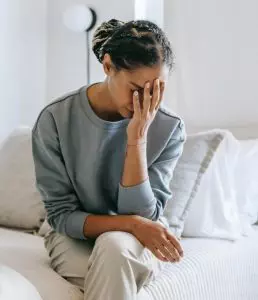
Shortness of breath, dyspnea? SIBO or fungal infections? Sensitive to smells? Signs of orthostatic low blood pressure? Itchy skin rash or hives? Musculoskeletal pain, joint pain? These can be some of the many different MCAS symptoms. Acupuncture and TCM can offer alternative treatment for MCAS, or mast cell activation disorders.
Mast Cell Activation Syndrome (MCAS) is a complex and often underdiagnosed condition characterized by the inappropriate activation of mast cells, which are immune cells involved in allergic and inflammatory responses throughout the body.
In short, mast cells are what cause people to have an allergic reaction to something. When mast cells encounter an allergen (or sometimes a medication, infection, or insect venom), antibodies inside them surface and send out “mediators.” Mast cells can produce hundreds of different types of mediators. These include histamine, leukotrienes and cytokines.
In MCAS, mast cells release excessive amounts of mediators, leading to a wide range of symptoms affecting various organ systems throughout the body. There are so many different mediators that science is not yet able to pinpoint which mediators may be causing which symptoms, in many cases.
This systemic activation of mast cells can occur spontaneously or in response to triggers such as stress, exercise, medications, infections, or environmental factors.
The symptoms of MCAS can vary widely among individuals and may mimic those of other conditions, making diagnosis challenging. There are five categories of MCAS symptom, affecting different parts or systems of the body:
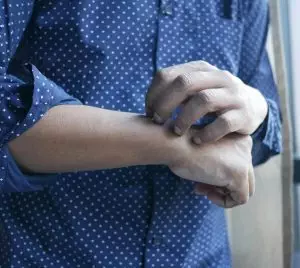
Skin-related MCAS Symptoms:
Itching (pruritus)
Hives (urticaria)
Flushing or redness of the skin
Rashes or eczema-like lesions
Swelling (angioedema), particularly of the face, lips, tongue, or throat
Gastrointestinal MCAS Symptoms:
Abdominal pain or cramping
Nausea and vomiting
Diarrhea or constipation
Acid reflux or heartburn
Bloating or abdominal distension
Respiratory MCAS Symptoms:
Wheezing or difficulty breathing (dyspnea)
Chest tightness or pain
Coughing or throat clearing
Nasal congestion or runny nose
Sneezing or postnasal drip
Cardiovascular MCAS symptoms:
Rapid or irregular heartbeat (palpitations)
Low blood pressure (hypotension)
Fainting or near-fainting episodes (syncope)
Fluctuations in blood pressure upon standing (orthostatic hypotension)
Raynaud’s phenomenon (abnormal blood vessel spasm in response to cold or stress)
Neurological MCAS symptoms:
Headaches or migraines
Dizziness or lightheadedness
Cognitive dysfunction or brain fog
Anxiety or panic attacks
Fatigue or malaise
These symptoms can vary in severity and may occur intermittently or chronically.
What Causes MCAS?
Medical science is unclear about the underlying cause of MCAS. Mastocytosis is a different mast cell disorder, in which people have an elevated number of mast cells. However, with MCAS, people have a normal number of mast cells; they just behave in an exaggerated manner when triggered.
MCAS is “primary” when there is a particular genetic mutation, which may happen due to mastocytosis or monoclonal mast cell activation syndrome (MMAS,) in which there is a clonal line of mast cells.
In some cases, when a person also has a diagnosed autoimmune disorder, allergy, or infection the MCAS is considered “secondary,” meaning that the overactive mast cell activity may be stemming from that other primary condition.
A diagnosis of “Idiopathic MCAS” indicates that neither of the above factors is present.
MCAS can begin at any point in a person’s life, including during childhood.
MCAS Treatment
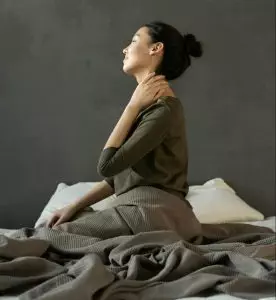
Treatment for Mast Cell Activation Syndrome (MCAS) in Western medicine typically involves a combination of medications and lifestyle modifications aimed at stabilizing mast cells and alleviating symptoms.
Antihistamines, such as H1 receptor blockers (e.g., loratadine, cetirizine) and H2 receptor blockers (e.g., famotidine, ranitidine), are commonly prescribed to reduce the effects of histamine released by mast cells.
Mast cell stabilizers, such as cromolyn sodium, can help prevent the release of inflammatory mediators from mast cells and may be used as preventive therapy. In cases of severe or refractory symptoms, corticosteroids or leukotriene inhibitors may be prescribed to suppress the immune response and reduce inflammation.
Medications to manage specific symptoms, such as gastrointestinal distress or cardiovascular symptoms, may be recommended.
Lifestyle modifications, such as avoiding known triggers, managing stress, and following a healthy diet, may also play a crucial role in managing MCAS symptoms.
It’s important for individuals with MCAS to work closely with their healthcare providers to develop a personalized treatment plan. Acupuncture and TCM can provide adjunct treatment for MCAS that address each patient’s unique symptoms and needs.
Can Acupuncture Help MCAS?
One of the central concepts of Traditional Chinese Medicine, which dates back many centuries, is that of the meridian system. The 12 meridians are channels of energy, or Qi, that flow throughout the body. Along the meridians are many acupoints: spots where Qi is activated when thin acupuncture needles or acupressure are applied to them.
But do the meridians exist as physical entities, or are they metaphorical?
Scientific research in the twentieth century sought to explain the various phenomena produced by the activation and manipulation of acupoints. It was found that both blood vessels and nerves are located near the acupoints in greater concentration than in other areas of the body. These studies suggested that acupuncture treatment functions through the vascular and nervous systems.
Later, further studies showed that acupuncture has effects on the production and releasing of hormones, such as endorphins, which has a analgesic effect of reducing pain.
The sensations that people feel as a result of acupuncture treatment cannot be fully explained by saying they are related to blood vessels, nerves, or hormones. Further questioning continued, asking if other cells or tissues could also be involved in how acupuncture works.
One female scientist, researcher, and professor in China, Jimei Song, hypothesized that activity around acupoints may be related to mast cell activation. This idea was Song’s Mast Cell Theory of Acupuncture (now called Song’s MC Theory for short, originally published in the Liaoning Journal of Traditional Chinese Medicine (TCM) in 1977.

Studies suggest that when an acupuncture needle penetrates the skin, mast cells are released, which then in turn, affect the blood vessels and nerves, leading to both sensations experienced by the patient in the moments, and systemic effects on the release of histamines, serotonin, and other chemicals than go on to create systemic effects. This is now considered a milestone in TCM research.
Acupuncture has been shown to have a positive effect on histamine response. Specific Chinese herbal formulas have also been shown to be effective in dampening mast cell activation. Compounds found in some herbs can help inhibit the production of cytokines.
An acupuncturist is able to address the problem both at its root, and help take care of the wide variety of symptoms a person may be experiencing. Acupuncture treatment can help relieve problems like itchy skin rash, sensitivities, orthostatic low blood pressure, and joint pain, all in one treatment session. A personalized herb formula can be prescribed to suit each individual patient.
Acupuncture Near Me for MCAS in Los Angeles
MCAS can mimic many other conditions and be difficult to diagnose and treat. This is what makes acupuncture, herbs, and moxibustion excellent modalities for helping to relieve MCAS symptoms such as: dizziness, headaches, musculoskeletal pain, insomnia, anxiety, hives, GERD, SIBO, IBS, interstitial cystitis bladder pressure, and more. Acupuncture and TCM can offer an adjunct or alternative treatment for MCAS symptoms.
*This article is for education from the perspective of Traditional Chinese Medicine only. The education provided by this article is not approved by FDA to diagnose, prevent, treat and cure human diseases. It should not stop you from consulting with your physician for your medical conditions. Traditional Chinese Medicine is based on Qi, which is an invisible force that usually cannot be observed by modern science. Because science focuses on testing ideas about the natural world with evidence obtained through observation, these aspects of acupuncture can’t be studied by science. Therefore acupuncture and Chinese herbs are often not supported by double-blind, randomized trials, and they are considered alternative medicine therapies in the United States.
How to Treat Raynaud’s Syndrome With Acupuncture and TCM
By Qineng Tan, L.Ac., Ph.D. and Xiaomei Cai, L.Ac. Ph.D.

Fingers numb? Numbness in fingers and toes? Fingers turning white, poor circulation in fingers, cold fingers and toes? Raynaud’s disease, or Raynaud’s phenomenon, causes poor circulation in the extremities due to constriction of the blood vessels, usually triggered by cold weather or stress. Acupuncture can help relieve Raynaud’s disease symptoms.
Raynaud’s disease is a condition characterized by occasional narrowing of the blood vessels, primarily in the fingers and toes. The small arteries that supply blood to the skin of the fingers and toes (and sometimes, to the ears and the tip of the nose) become constricted in cold conditions.
Raynaud’s syndrome causes the tips of the fingers and/or toes to turn white due to the lack of circulation, and there may be numbness in fingers or tingling in toes. A “Raynaud’s attack” or episode lasts until the person warms up, at which point, there may be a burning sensation, and the affected skin may flush and turn red as blood flow returns.
Raynaud’s can occur in two forms: primary and secondary.
Primary Raynaud’s, also called Raynaud’s disease, is the more common form and isn’t usually related to another medical condition. Raynaud’s is considered to be an exaggerated response to cold, emotional stress or anxiety, leading to spasms in the small arteries.
People with primary Raynaud’s phenomenon usually begin to experience symptomatic episodes during their teenage years. Women are more likely to have Raynaud’s.
Secondary Raynaud’s is less common but more serious. It is associated with other diseases, typically autoimmune diseases or connective tissue disorders, like scleroderma, rheumatoid arthritis, thyroid disorders, or lupus.
Secondary Raynaud’s can be linked to conditions that directly damage the arteries or affect blood flow, like carpal tunnel syndrome. In these cases, it is considered a symptom rather than a separate condition.
Raynaud’s Syndrome Causes
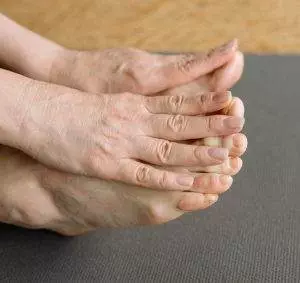
For most people with Raynaud’s syndrome, there is probably a combination of genetic, physiological, and environmental factors at play.
Vascular abnormalities, or dysfunction in the blood vessels, involving excessive narrowing (vasospasm) and poor dilation in response to stimuli, may be involved.
Overactivity of the nerves controlling the blood vessels (sympathetic nervous system) may cause spasms.
Raynaud’s can tend to run in some families. If someone is already susceptible, then the numbness in fingers and toes may be triggered by cold temperatures, or a stressful situation. Smoking cigarettes can also cause Raynaud’s symptoms.
In secondary Raynaud’s, underlying autoimmune conditions can lead to inflammation and damage to blood vessels.
An injury to one of the limbs, like a broken wrist, or damage to the tissues from frostbite, could also trigger Raynaud’s phenomenon.
Some prescription medications, such as beta blockers, ADHD medications, medications for migraine headaches, and even some cold and flu medicines, could cause Raynaud’s symptoms.
Acupuncture treatment can help to relieve Raynaud’s syndrome symptoms and also address the underlying condition that may cause Raynaud’s.
Top 10 Raynaud’s Disease Symptoms
Raynaud’s symptoms may show up differently for each person. Symptoms of Raynaud’s disease can vary in severity and may include:
- Skin changes color: pallor (pale skin, white skin, or yellow skin) in the affected fingers or toes during an episode
- In rare cases, Raynaud’s phenomenon can affect other areas, such as the nose, ears, and lips.
- Some people may experience Raynaud’s in their nipples, which can cause a severe throbbing pain.
- Bluish discoloration (Cyanosis) as blood flow decreases
- Affected areas feel cold and/or numb during an episode
- Throbbing or tingling in the fingers or in the toes
- Sensitivity to cold temperatures, leading to more frequent episodes in cold weather.
- In severe cases, recurrent or persistent episodes of reduced blood flow can lead to skin sores or ulcers, particularly on the fingertips or toes.
- Changes in the texture and color of the nails, including nail beds that turn white and then blue during an episode.
- Some individuals may experience joint pain, particularly if there is an underlying connective tissue disorder.
Emotional stress, anxiety, or rapid changes in temperature can trigger Raynaud’s symptoms.
Raynaud’s disease is generally considered a benign condition, but repeated episodes can lead to more serious problems, like skin sores, chilblains, or even gangrene, which can cause permanent damage to tissues.
Raynaud’s Syndrome Treatment
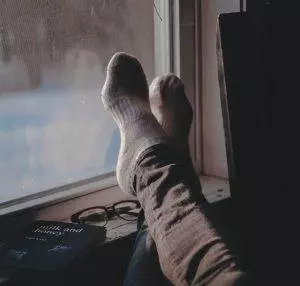
Diagnosis of Raynaud’s disease may involve a test called nailfold capillaroscopy. This is a non-invasive test that allows the doctor to see the capillary size and action in the tips of the fingers and nail bed. This can help to determine whether the person has Primary Raynaud’s, or may have a connective tissue disorder, like lupus or Sjogren’s syndrome.
The standard medical treatment for Raynaud’s phenomenon aims to manage symptoms, improve blood flow, and prevent complications. While there is no cure for Raynaud’s, various medications and lifestyle modifications can be employed to alleviate symptoms and enhance circulation.
Medications that relax and widen blood vessels, known as vasodilators, are commonly prescribed. Calcium channel blockers, such as nifedipine, are often used to help dilate the small blood vessels in the extremities, reducing the frequency and severity of Raynaud’s episodes.
Phosphodiesterase inhibitors like sildenafil (which is also commonly prescribed to help erectile dysfunction, ED) can sometimes be beneficial in promoting blood vessel dilation and improving blood flow.
In some cases, topical nitroglycerin cream may be prescribed to increase blood flow to the affected areas.
Endothelin receptor antagonists, such as bosentan, may be considered in cases where blood vessel constriction is severe. These medications target endothelin, a substance that can cause blood vessels to narrow.
Antiplatelet agents like aspirin may be recommended to reduce the risk of blood clots and improve blood circulation.
If Raynaud’s is secondary to another condition, treating the underlying cause is crucial. For example, if it is associated with an autoimmune disorder, immunosuppressants might be considered.
Lifestyle changes play a significant role in managing Raynaud’s symptoms. Patients are typically advised to dress warmly.
Quitting smoking is strongly recommended, as smoking constricts blood vessels.
Can Acupuncture Help Raynaud’s Syndrome?
TCM has acknowledged Raynaud’s phenomenon as a condition of severe cold in the limbs for centuries. According to TCM theory, a deficiency of Qi and blood circulation is the root cause of Raynaud’s symptoms. In TCM, we consider that Qi (life force energy) and blood work together; Qi moves the blood throughout the body, and blood carries the Qi throughout the body.
In TCM, we are always looking at both external factors and internal factors that contribute to a condition. In the case of Raynaud’s disease, cold acts as a pathogenic factor that can be already present inside the body, and then, when a person is exposed to cold temperatures as an external factor, this triggers an extreme reaction.
So, in many cases, a person suffering from Raynaud’s is already dealing with too much cold and poor blood circulation. Herbs can be used to help warm the body internally and increase blood flow.
Some people develop Raynaud’s symptoms in response to stress. In this case, the liver may be involved. In TCM, the liver is associated with strong emotions, and when the liver is distressed, it can trigger muscular contractions that squeeze the blood vessels, restricting blood flow. In these cases, we will use herbal formulas and acupuncture points to help restore balance in the liver.
When there is an autoimmune disease also present, such as scleroderma or lupus, then there may also be blood stasis, and a thickening of the blood and tissues. TCM can address those conditions at their roots, as well.
An acupuncturist will make careful observations about how each individual is experiencing Raynaud’s symptoms, and address it according to the pattern presenting.
Top 3 Tips for Managing Raynaud’s Syndrome Symptoms

You can help prevent Raynaud’s attacks by keeping your whole body warm, especially your hands and feet.
- Protect your hands and feet. Wear mittens or gloves, thick socks and lined boots, and use hand and foot warmers in cold weather. Consider wearing gloves or oven mitts when reaching into the refrigerator or freezer.
- Exercise regularly, both to stimulate healthy blood circulation, and to help manage stress levels.
- If hands and/or feet do begin to feel cold or numb, take action to warm them up immediately by wiggling them, running them under warm water, massaging them, or putting your hands in your armpits or against your abdomen under your clothing.
Acupuncture Near Me for Raynaud’s Syndrome in West Los Angeles
It is important to address Raynaud’s disease to avoid damage to the nerves and skin tissue in your extremities, and to be sure whether or not Raynaud’s symptoms are related to an underlying autoimmune disorder. The acupuncturists at Art of Wellness Acupuncture in West L.A. have over 35 years of experience helping people with autoimmune conditions, circulatory problems, and nerve pain and tingling. The combination of herbs and acupuncture treatment can help relieve Raynaud’s phenomenon symptoms and address any autoimmune disease or nerve conditions.
*This article is for education from the perspective of Traditional Chinese Medicine only. The education provided by this article is not approved by FDA to diagnose, prevent, treat and cure human diseases. It should not stop you from consulting with your physician for your medical conditions. Traditional Chinese Medicine is based on Qi, which is an invisible force that usually cannot be observed by modern science. Because science focuses on testing ideas about the natural world with evidence obtained through observation, these aspects of acupuncture can’t be studied by science. Therefore acupuncture and Chinese herbs are often not supported by double-blind, randomized trials, and they are considered alternative medicine therapies in the United States.
How to Treat Vitiligo With Acupuncture and TCM
by Qineng Tan, L.Ac., Ph.D. and Xiaomei Cai, L.Ac., Ph.D.
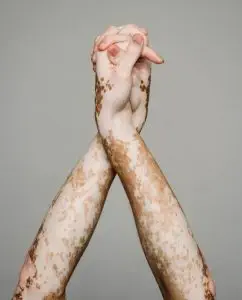
White patches on skin, white spots on face? Graying hair? White patches of skin can be a sign of Vitiligo. Vitiligo is a chronic autoimmune disease that affects the melanin, or pigment, in the skin. Acupuncture and TCM offer a holistic, complementary vitiligo treatment that can help with repigmentation.
Vitiligo occurs when the pigmentation of your skin changes, with white patches on face or other parts of the body. This usually happens because of an autoimmune disorder that affects the cells that create pigment in the skin, hair, and eyes.
Vitiligo can show up in different ways. Possible signs of vitiligo include:
- Lighter patches of skin on face, arms, hands, and/or feet, white patches on skin
- Patches can be pink, tan, or white
- Loss of pigmentation on lips and/or inside mouth
- Loss of pigmentation on or inside the nose
- White patches of skin are itchy sometimes, usually when they are spreading
- Premature graying hair, hair turning gray
- A streak of white hair on scalp develops
- Eyelashes turn white, or eyebrows turn white
- Eye color changes, may affect eyesight
- Inner ear problems, can lead to hearing loss
- Anxiety and depression due to changes in appearance
While vitiligo is not considered harmful, these changes in outward appearance can have a serious impact on the way a person feels about themselves. Vitiligo disease treatment with acupuncture and TCM can help not only with repigmentation, but can help address the underlying causes of autoimmune disease, and mental health concerns, all at the same time.
What Causes Vitiligo?
White patches on skin happen when cells called melanocytes, which produce pigment, either stop functioning correctly or die.
Medical research has not yet determined exactly why some people get vitiligo, but it is generally considered to occur because of an autoimmune condition. When a person has an autoimmune disorder, their immune system mistakenly attacks certain cells in the body. In the case of vitiligo, the immune system attacks the melanocytes.
Some people notice that their vitiligo starts developing after getting a particularly bad sunburn. A regular burn, or exposure to caustic chemicals can trigger the development of vitiligo, as can a bad cut or scrape.
Stress can trigger vitiligo, or make it worse. Both physical stress and emotional stress may often precede either the initial onset of vitiligo, or accelerate the spread of patches of vitiligo on the skin.
Risk factors for Vitiligo
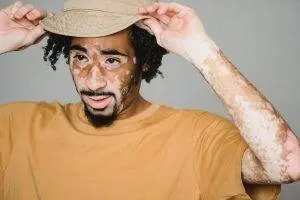
People of all ages and ethnicities can have vitiligo. In about half of cases, vitiligo begins to appear in childhood or before the age of 20.
If other people in your family have vitiligo, or other autoimmune diseases, then there is a greater chance that you will have it.
People who have other autoimmune disorders may have a higher risk of experiencing vitiligo. These autoimmune conditions include:
- Lupus
- Hyperthyroidism
- Hashimoto’s disease
- Graves disease
- Psoriasis
- Rheumatoid arthritis
- Type 1 Diabetes
- Anemia
- Addison’s disease
Having a specific type of moles on your skin called halo nevi can increase your risk for vitiligo. Those are moles that have a white ring, or “halo,” around them.
Having melanoma or non-Hodgkin lymphoma can also increase your risk for vitiligo, as can going through immunotherapy for melanoma.
Even though vitiligo is not considered dangerous, it is important to seek out a proper diagnosis and treatment, because having one autoimmune condition can sometimes lead to developing other autoimmune diseases.
Types of Vitiligo
Vitiligo will develop differently for each individual. Different kinds of vitiligo are categorized according to where they appear. Types of vitiligo include:
- Generalized vitiligo: most common type, causes macules to appear in various places on the body
- Segmental vitiligo: only affects one side of your body or one area, such as the face or hands.
- Mucosal vitiligo: affects the mucous membranes of mouth and/or genitals
- Focal vitiligo: rare type where the macules develop in a small area
- Trichrome vitiligo: shows up as a bullseye shape with a white center, a lighter area, and an area of natural skin tone.
- Universal vitiligo: rare condition that causes more than 80% of skin to not have pigment
Vitiligo Treatment
A doctor will diagnose vitiligo by taking a family history, testing for other autoimmune diseases, checking the skin with a black light, which will make the patches easier to detect, and probably taking a small skin biopsy to check for melanocytes, or lack thereof.
The main aim of conventional vitiligo disease treatment is to slow the spread of the condition, and hopefully to help the skin regain its pigment by helping to encourage the growth of melanocytes.
Immunosuppressant medications can help to slow or halt the spread of vitiligo. Calcineurin inhibitors are a specific type of immunosuppressants that may be prescribed for vitiligo, as well as for other autoimmune disease rash, such as lupus rash.
However, this type of vitiligo treatment requires continued use; when people stop taking the medications, the condition will usually come back and continue to spread.
There are various types of vitiligo therapy that may help skin regain its normal pigmentation. These include:
- Light therapy
- Topical steroid creams
Some dermatology specialists perform surgical procedures to help with repigmentation, but these are not recommended if the condition is still spreading, or if a person tends to develop scarring.

About 50% of vitiligo cases begin in childhood or adolescence. Vitiligo can be particularly difficult and even traumatic for young people. While the treatment methods are similar for children with vitiligo (corticosteroids, phototherapy, and/or immunosuppressants), it is especially important that young patients also receive emotional and mental health support during treatment.
While medical vitiligo therapies help in some cases, other people may not see much improvement. None of these treatments address the root cause of vitiligo. Acupuncture and TCM help by working on several levels, to help restore normal functioning of the immune system, help with repigmentation of the white patches of skin, and to help address issues like anxiety and depression, as well.
Can Acupuncture Help Vitiligo?
Traditional Chinese Medicine (TCM) has been used to treat vitiligo for centuries. TCM treatment for vitiligo was first mentioned in the medical text, The Yellow Emperor’s Classic of Internal Medicine, over 2500 years ago.
In TCM, vitiligo is referred to as “Bai Dian Feng,” which means something akin to “white patches wind.” In TCM, many skin and immune conditions are considered to be related to wind as a pathogenic force that moves through the body.
The development of this autoimmune condition that affects the skin’s appearance can occur due to a particular imbalance, or a combination of factors. Some of the TCM diagnostic patterns that pertain to vitiligo include:
- Liver wind with Kidney deficiency
- Spleen and Stomach deficiency
- Qi and Blood deficiency and/or stasis
- Too much internal heat
Depending on accompanying symptoms, your acupuncturist will observe which organ systems need nourishing and/or clearing, and will tailor a treatment plan for each individual case. A combination of acupuncture treatment and herbal supplements will be recommended to help address your condition.
Acupuncture needles, applied to specific points, can help to improve circulation and blood flow to areas of the skin and activate cells to help restore natural skin color. Other points will be chosen to help move Qi and strengthen the liver and kidneys, as well as reducing overall inflammation and boosting immune function.
Topical herb creams made from traditional Chinese herbal remedies can be effective for helping to stimulate melanin production. Chinese herb formulas designed to be taken internally as a tea will work to nourish the liver and kidneys, dispel wind and clear heat.
Acupuncture Near Me for Vitiligo
Acupuncture and herbs can be used either as an alternative or adjunct treatment for vitiligo. TCM treatment will also work for vitiligo in children, and can be particularly helpful as a gentle modality that does not cause unwanted side effects.
Drs. Tan and Cai at Art of Wellness Acupuncture in West L.A. have over 35 years of experience working with patients with autoimmune skin conditions of all kinds. Art of Wellness was recently named one of the best acupuncture providers in Los Angeles. If you or someone you know is suffering with vitiligo, please do not hesitate to contact us.
*This article is for education from the perspective of Traditional Chinese Medicine only. The education provided by this article is not approved by FDA to diagnose, prevent, treat and cure human diseases. It should not stop you from consulting with your physician for your medical conditions. Traditional Chinese Medicine is based on Qi, which is an invisible force that usually cannot be observed by modern science. Because science focuses on testing ideas about the natural world with evidence obtained through observation, these aspects of acupuncture can’t be studied by science. Therefore acupuncture and Chinese herbs are often not supported by double-blind, randomized trials, and they are considered alternative medicine therapies in the United States.
How to Treat Diarrhea With Acupuncture and TCM
By Qineng Tan, L.Ac., Ph.D. & Xiaomei Cai, L.Ac., Ph.D.
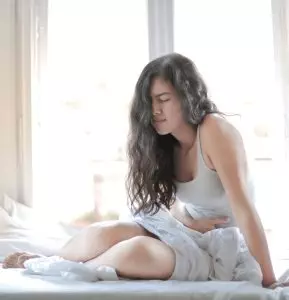
Chronic diarrhea, explosive diarrhea, diarrhea after eating? Diarrhea may be related to IBS (irritable bowel syndrome), or an IBD (inflammatory bowel disease), or a reaction to a food allergy, parasites, or stress. Acupuncture and TCM offer an alternative diarrhea treatment, so you can get relief from stomach pain and diarrhea.
Why Do I Have Diarrhea?
There can be many different causes of diarrhea, also known as loose stool. Acute diarrhea, which only lasts one or two days, will usually go away on its own.
Watery diarrhea that lasts a few days is usually due to food poisoning. Eating something that was rotten, or not cooked properly to destroy bacteria, can cause vomiting and diarrhea. Watery diarrhea can also happen when you have some type of viral infection, such as the “stomach flu.”
Chronic diarrhea, or persistent diarrhea, which lasts for weeks, or bouts of diarrhea that come and go frequently, may be related to IBS symptoms, IBD symptoms, Celiac disease, SIBO, or some other problem.
More than 6% of adults in the U.S. report having chronic diarrhea. Chronic diarrhea in children is also a serious health concern worldwide.
Top 10 Causes of Diarrhea
Diarrhea is a common condition that everyone experiences sometimes. Usually it is temporary, but it can become persistent and serious enough to require diarrhea treatment. The most common reasons a person experiences loose bowel movements include:
- Bacterial infection, traveler’s diarrhea, food poisoning, unsafe drinking water
- Viral infection, such as rotavirus, viral gastroenteritis, stomach flu
- Parasite infection, such as giardiasis
- Food allergy, food intolerance, food sensitivity, Celiac disease
- Reaction to medications like antibiotics, antidepressants, or Metformin
- Reaction to radiation therapy, cancer treatment
- IBS – diarrhea, constipation, and stomach cramps are common IBS symptoms
- IBD – colitis or Crohn’s disease, inflammatory autoimmune disorders that affect the gut
- Malabsorption of food, poor absorption of nutrients
- Menstrual cycle or Perimenopause – changes in hormones/estrogen can cause diarrhea
Certain foods can cause diarrhea, including: too much coffee, artificial sweeteners like mannitol and sorbitol, and red food coloring. Magnesium supplements can also cause loose stools.
If diarrhea lasts more than a few days, it is important to seek healthcare advice. Chronic diarrhea can lead to dehydration and fatigue, and may be happening because of some more serious condition that needs to be addressed.
What Causes Chronic Diarrhea?
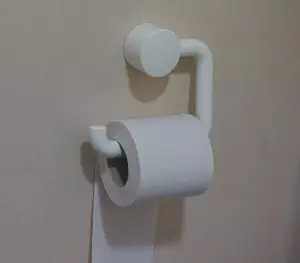
Bouts of diarrhea that keep recurring can be a symptom of disorders such as:
- IBD (inflammatory bowel disease) – the most common IBDs are ulcerative colitis and Crohn’s disease. IBD symptoms usually include bloody diarrhea and abdominal pain. IBDs can cause chronic or recurring diarrhea, which can lead to dehydration, fatigue, and weight loss. IBDs can be mild, or so serious that they cause long-lasting damage to the gastrointestinal tract.
- Ulcerative colitis – an autoimmune disorder that causes inflammation and ulcers, or open sores, in the lower gastrointestinal system, including the colon and rectum.
- Crohn’s disease – an autoimmune disorder that causes inflammation mainly in the small intestine, but can affect any part of the GI tract.
- IBS – Irritable bowel syndrome can seem similar to IBDs, also causing recurring bouts of diarrhea and stomach pain. However, IBS is considered a functional gastrointestinal disorder. It is quite common. People with IBS symptoms may have alternating bouts of diarrhea and constipation. People who tend to have more diarrhea-dominant IBS have “IBS-D.”
- Celiac disease – an autoimmune disorder in which a reaction to eating wheat gluten causes serious inflammation of the GI system, leading to abdominal pain, bloated stomach, diarrhea, malnutrition, fatigue, and skin rashes.
With these conditions, diarrhea is brought on periodically—sometimes alternating with constipation, as in some cases of IBS—by factors having to do with the diet or stress, or with autoimmune processes.
Some surgeries that affect the gastrointestinal organs—like gastric bypass, gastric sleeve, or gallbladder removal—can cause chronic diarrhea.
Chronic diarrhea can be caused by an inability of the intestinal walls to absorb nutrients, and/or of the walls of the colon to absorb liquid. It may also be due to excessive action of the intestine in terms of peristalsis, the squeezing of the intestine to move matter through.
Diarrhea Treatment
Acute diarrhea usually goes away on its own in a day or two. Often, people will use OTC remedies for diarrhea and stomach pain, such as Immodium or Pepto-Bismol.
If you have been experiencing persistent diarrhea and seek medical advice, a doctor will perform tests to figure out what is causing the diarrhea, and will offer electrolyte fluids to help with dehydration. Blood tests or a stool test will show if the diarrhea is due to a bacterial infection or parasitic infection.
If chronic diarrhea is determined to be related to a medication you are already taking, then that may need to be adjusted.
Discovery of IBS or an IBD usually involves more diagnostic testing, including a colonoscopy and/or endoscopy, to see if there is inflammation or blockage in the GI tract.
Medical treatment for IBS may involve being offered antispasmodic medications that relax the intestinal walls and slow down the movement of the bowels and can help relieve stomach cramps and abdominal cramping. Dietary changes and behavioral therapy may be recommended.
Pharmacological treatment for IBDs like colitis and Crohn’s usually involves taking a combination of anti-inflammatories and immunosuppressants, to reduce inflammation in the gut and to block the inappropriate autoimmune responses that are triggering the inflammation. Unfortunately, steroids and medications like Xeljanz can cause other side effects and health problems.
Medical treatment for chronic diarrhea may help relieve symptoms and reduce the frequency of bouts of diarrhea, but it does not necessarily address the underlying causes of diarrhea.
Acupuncture and TCM offer an effective alternative treatment for diarrhea that is more suited to each patient’s individual situation.
Can Acupuncture Help Diarrhea?
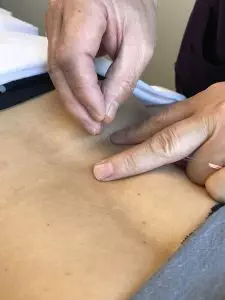
Chronic diarrhea, according to TCM theory, is usually considered to be related to the health of the spleen. In TCM, the organ systems all interact harmoniously, unless there is imbalance. The imbalance of one organ system may throw off other systems, leading to various symptoms.
In TCM, the spleen is responsible for breaking down the nutrients from food and converting them into energy. If the spleen is not functioning properly, watery stool is often the result. Diarrhea, stomach pain, and other symptoms may differ from person to person, depending on how the spleen is interacting with the liver, stomach, or kidneys.
Common Chinese Medicine diagnosis patterns for chronic diarrhea include:
- Spleen Deficiency with Liver Qi stagnation: mucus in the stool, abdominal pain, cramping, gassiness, bloated stomach, irritability, and feelings of depression
- Spleen Deficiency with Stomach deficiency: watery stools, poor appetite, feeling full quickly, stomach distended after eating, pallor, and fatigue
- Spleen Deficiency with Kidney Deficiency: diarrhea in the morning, partially digested food in the stool, abdominal pain, lower back pain, knee pain, feeling cold
Acupuncture treatment for diarrhea, which may include moxibustion and herbs, aims to support the health of the spleen and other organs. Acupuncture has been shown to help relieve diarrhea and constipation related to IBS. Acupuncture treatment can also help with reducing stress and anxiety, which are common triggers for IBS symptoms.
Acupuncture can also help with diarrhea due to IBDs like ulcerative colitis and Crohn’s disease by reducing inflammation and helping to balance immune responses. TCM treatment for Crohn’s disease or colitis, incorporating nutrition and herbal supplements, can help improve the gut biome and strengthen the lining of the intestinal walls.
Acupuncture for Diarrhea Near Me, Los Angeles, West L.A., and Santa Monica
TCM treatment with an experienced acupuncturist near me can be very beneficial for anyone dealing with ongoing gastrointestinal distress. Both adults and children can find relief from diarrhea, constipation, stomach cramps, bloating, and abdominal pain related to conditions like IBS, IBDs, or celiac disease through acupuncture and herbs. At Art of Wellness, we have over 30 years of experience helping people with gastric disorders of all kinds.
*This article is for education from the perspective of Traditional Chinese Medicine only. The education provided by this article is not approved by FDA to diagnose, prevent, treat and cure human diseases. It should not stop you from consulting with your physician for your medical conditions. Traditional Chinese Medicine is based on Qi, which is an invisible force that usually cannot be observed by modern science. Because science focuses on testing ideas about the natural world with evidence obtained through observation, these aspects of acupuncture can’t be studied by science. Therefore acupuncture and Chinese herbs are often not supported by double-blind, randomized trials, and they are considered alternative medicine therapies in the United States.
How to Treat Dermatitis With Acupuncture and TCM
By Xiaomei Cai, L.Ac., Ph.D. & Qineng Tan, L.Ac., Ph.D.
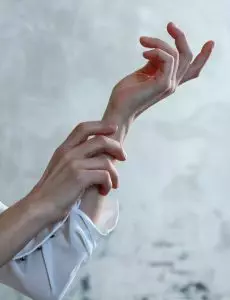
Itchy skin, dry skin irritation, or skin rash? Dermatitis is a broad term that covers many skin problems, including eczema, heat rash, diaper rash, and other kinds of skin allergy. Acupuncture and TCM offer a way to treat dermatitis, eczema, and itchy skin conditions.
The medical term “dermatitis” can refer to many types of skin irritation that involve inflammation. Inflamed skin can cause itching, redness, dryness, and rashes. A dermatitis itchy skin rash is caused by an inflammatory response related to the immune system.
Eczema, also known as atopic dermatitis, is a common inflammatory skin condition; over 30 million people in the U.S. have some type of eczema. Eczema can show up as early as a few weeks after birth in some babies, or during childhood, or during adulthood.
While what exactly causes atopic dermatitis to occur in some people is not completely understood, it is generally accepted that it is a combination of genetic, immunological, and environmental factors.
Dermatitis is not contagious; it is not passed from person to person. However, you are more likely to be susceptible to dermatitis or eczema if other people in your family have it, or if there is a family history of allergies and asthma.
Eczema and other forms of dermatitis tend to “flare up” when a person is exposed to some sort of trigger and has an allergic reaction. This could be due to something in the environment, or some product or plant that touched the person’s skin. It can also be due to internal causes, like an autoimmune problem, excess heat in the body, or emotional stress.
Signs of Dermatitis:
- Itchy dry skin rash skin irritations (pruritus)
- Red rash, red bumps on skin
- Rash like a burn
- Blisters
- Thick skin, hard skin, swelling
- Scaly skin, creasing skin
- Crusty sores, painful skin sores
- Bleeding rash, oozing skin rash
- Flaking skin (dandruff)
Symptoms of dermatitis can come and go. Scratching at itchy patches or blisters associated with dermatitis can cause a skin infection, so it is important to manage and control this condition.
Acupuncture and TCM herbs can help relieve itchy skin and inflammation, while also helping to balance the immune system to prevent further eczema flare ups.
Top 10 Types of Dermatitis
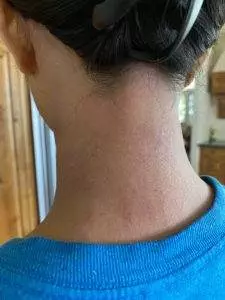
Many different conditions can cause dermatitis—meaning, inflammation of the skin. Different kinds of dermatitis include:
- Atopic dermatitis – also known as eczema, marked by dry, itchy, red patches of skin.
- Contact dermatitis – this is when a skin rash breaks out due to exposure to some kind of external irritant, such as a cosmetic product, piece of jewelry, or plant like poison ivy.
- Seborrheic dermatitis – flaking skin, also known as dandruff, occurs mostly on oily areas of the skin.
- Dyshidrotic dermatitis – (also called dyshidrotic eczema or pompholyx) small, itchy, fluid-filled blisters that appear on the soles of the feet or palms of the hands, or the tips of the fingers or toes. The blisters may break out due to exposure to an allergen or when hands and feet are often wet or sweaty.
- Diaper rash – a red rash that forms on a baby’s bottom or perineal area due to contact with the diaper and frequent wetness.
- Neurodermatitis – (also called lichen simplex chronicus) is a type of eczema marked by one or two very itchy, scaly patches that can become thickened and leathery – most often affects an area on the neck, ankle, arm, or groin. Neurodermatitis can itch so intensely that it affects a person’s sleep, and can be triggered by stressful events.
- Nummular dermatitis – (also known as discoid eczema) is marked by round, coin-shaped lesions that appear on the limbs or torso. These lesions can become infected with scratching, and may be related to poor circulation.
- Perioral dermatitis or Periorificial dermatitis – pink scaly patches or pustules that form around the mouth. This occurs more commonly in young women. Some doctors believe it may be related to candida, and/or influenced by hormones.
- Stasis dermatitis – (also called venous stasis dermatitis) itchy, scaly, discolored skin around the lower legs and ankles, due to poor circulation and blood pooling in the lower extremities.
- Dermatitis herpetiformis – a bumpy, blistered skin rash (looks similar to a herpes outbreak, but is not actually related to herpes simplex) that is related to celiac disease, triggered by ingesting gluten or wheat.
Psoriasis can look similar to eczema, but it is a separate condition that can coexist with various types of dermatitis. Rosacea redness can also look similar to dermatitis, but is a distinctly different condition that can occur at the same time as dermatitis.
What Causes Dermatitis?
A combination of the immune system reacting to irritants in the environment, and genetic predisposition.
Common environmental factors that can contribute to dermatitis include:
- Chemicals
- Air pollutants
- Fluoride in water or toothpaste
- Fragrances, perfumes, air freshener
- Fragrances in skin products, cosmetics, lotions, soaps
- Tobacco smoke
Other conditions that may occur simultaneously with dermatitis include: depression, anxiety, insomnia, allergies, and asthma.
Eczema Treatment
There are many different types of medical treatment for dermatitis. Some are topical—meaning, applied to the skin. Others are taken in an oral pill form, or injected into the skin.
Topical corticosteroid creams, which can help reduce skin inflammation, are the most common treatment for eczema and dermatitis. These can help reduce itching and swelling. However, prolonged use of topical steroids can cause side effects like thin skin, spider veins, and acne. Steroids can affect growth in children, and can cause eye problems like glaucoma or cataracts in older people.
Steroids that are taken orally, like Prednisone, can help control systemic inflammation for a time, while patches of scaly skin heal. However, there are many serious side effects associated with taking steroids for a long time, and it is also possible to experience a “rebound effect.” This means that the dermatitis symptoms come back even stronger when a person stops taking the steroid medications.
Calineuron inhibitors and JAK inhibitors are designed to stop certain chemical processes in the body related to immune responses. They can help block immune system reactions to calm the dermatitis skin problems.
There are many new types of treatment for eczema being developed. Phototherapy, or light therapy, using ultraviolet (UV) light, may be tried when topical treatments are not working for eczema that is widespread over the whole body. However, this kind of therapy can cause prematurely aging skin, changing skin pigmentation, and potentially increase the risk of skin cancer.
Acupuncture and TCM herbal supplements offer a way to treat eczema without any damaging side effects.
Can Acupuncture Help Dermatitis and Eczema?
One of the core concepts of TCM is the 5 Elements Theory, according to which organs of the body correspond with seasons and weather conditions. According to this theory, eczema and other kinds of dermatitis arise due to imbalances within the internal organ systems affected by external conditions, such as Wind and Heat.
The lungs, especially, are connected to the skin in the TCM system. The lungs can be affected by excess heat or stagnation in the liver. Thus, an itchy red rash on the skin is actually an expression of a deeper, more complex internal condition. Therefore, it is necessary to treat dermatitis and eczema not only with topical creams, but to use acupuncture and herbs to balance all of the organ systems.
The acupuncturist gets clues about which internal organs are out of harmony by observing the eczema symptoms: the type of rash or scaly skin, the color and temperature. Each individual case of dermatitis is unique, triggered by different irritants, and arising from a person’s overall state of health.
One study showed that acupuncture treatment worked better than antihistamines for helping to reduce the itchiness of atopic dermatitis pruritus. Acupuncture also helps to reduce inflammation and overall stress.
Studies done in China to determine the efficacy of an herbal formulation developed for eczema showed that it worked well to reduce itching and recurrence of rash.
As systematic review of over 350 studies on acupuncture for eczema showed the patients who were given acupuncture treatment instead of conventional treatment experienced better overall symptom reduction and quality of life.
Top 5 Tips to Prevent Dermatitis Itchy Skin

There are things you can do to help prevent eczema flare-ups from occurring and avoid recurrent rashes.
- Do not bathe in very hot water.
- Keep showers short and warm, and use gentle cleansers, without strong chemical perfumes.
- Do not scrub your skin during or after the shower, while drying. Pat gently.
- Use moisturizer frequently to maintain a protective layer on your skin.
- Wear long pants and sleeves when hiking and adventuring. Wear gloves when gardening.
Acupuncture Near Me for Dermatitis in Los Angeles and Santa Monica
Acupuncture can help relieve itching, aid in the healing of lesions, help stimulate healthier immune responses, and reduce stress. TCM treatment can also be sought as a safe treatment for children with eczema, or during pregnancy, as it is free of negative side effects.
TCM can also help patients with other skin conditions, including signs of aging, acne, hives (urticaria), rosacea, vitiligo, and psoriasis.
*This article is for education from the perspective of Traditional Chinese Medicine only. The education provided by this article is not approved by FDA to diagnose, prevent, treat and cure human diseases. It should not stop you from consulting with your physician for your medical conditions. Traditional Chinese Medicine is based on Qi, which is an invisible force that usually cannot be observed by modern science. Because science focuses on testing ideas about the natural world with evidence obtained through observation, these aspects of acupuncture can’t be studied by science. Therefore acupuncture and Chinese herbs are often not supported by double-blind, randomized trials, and they are considered alternative medicine therapies in the United States.